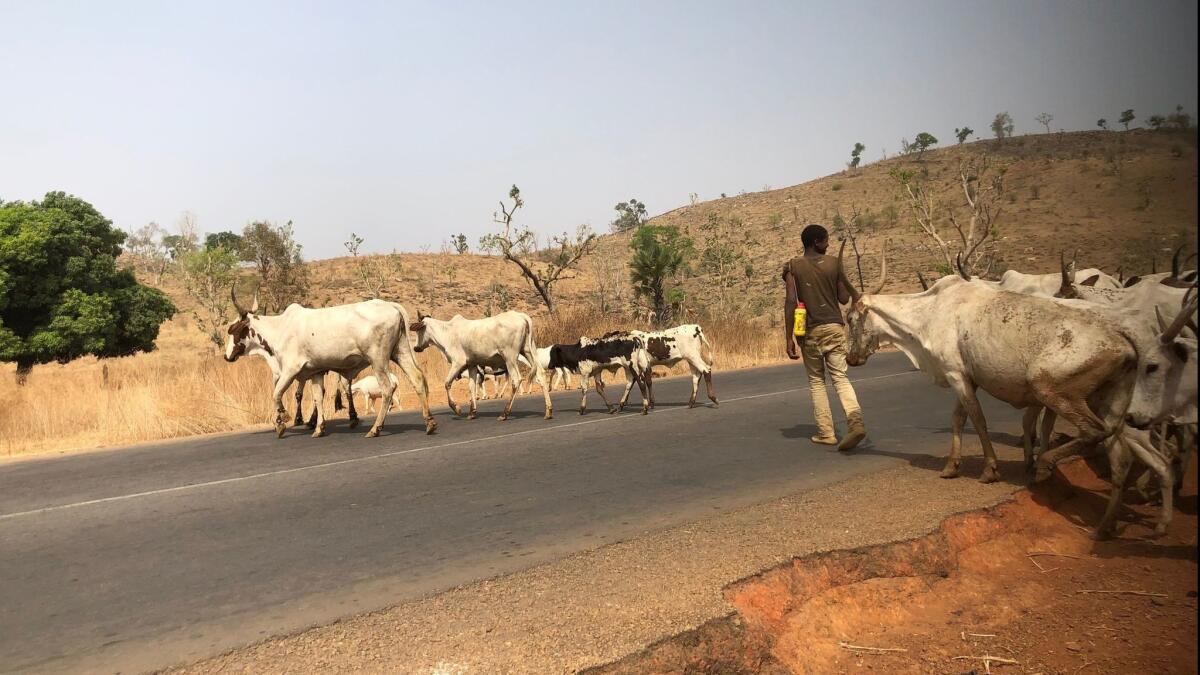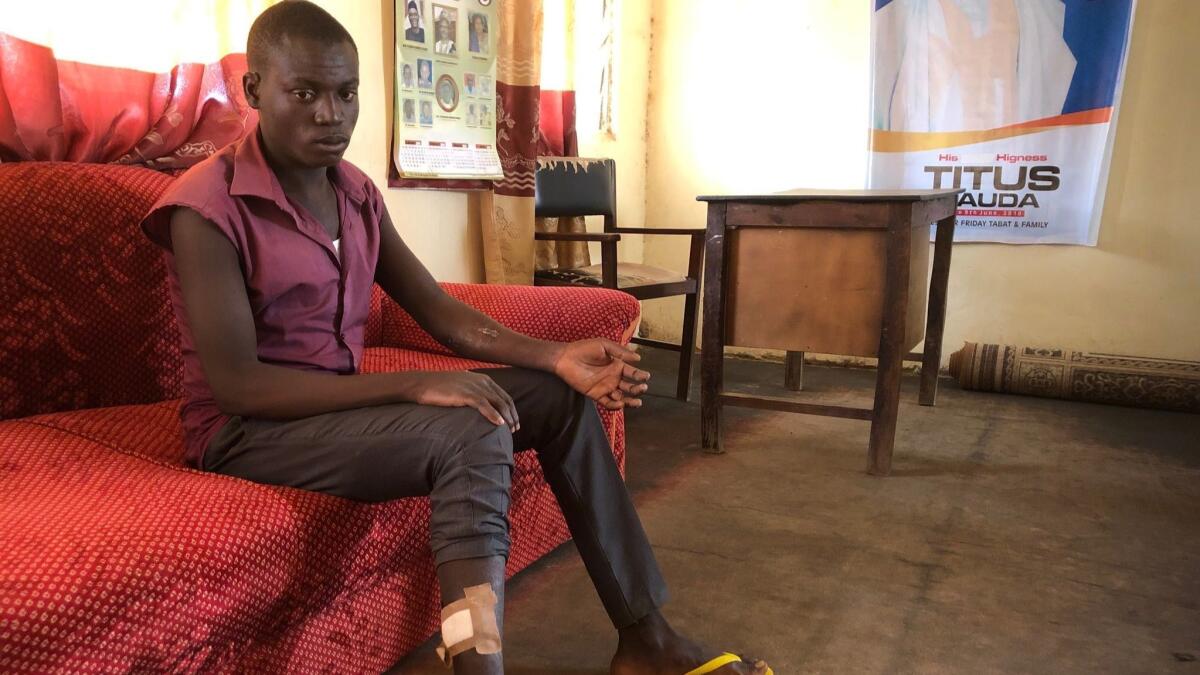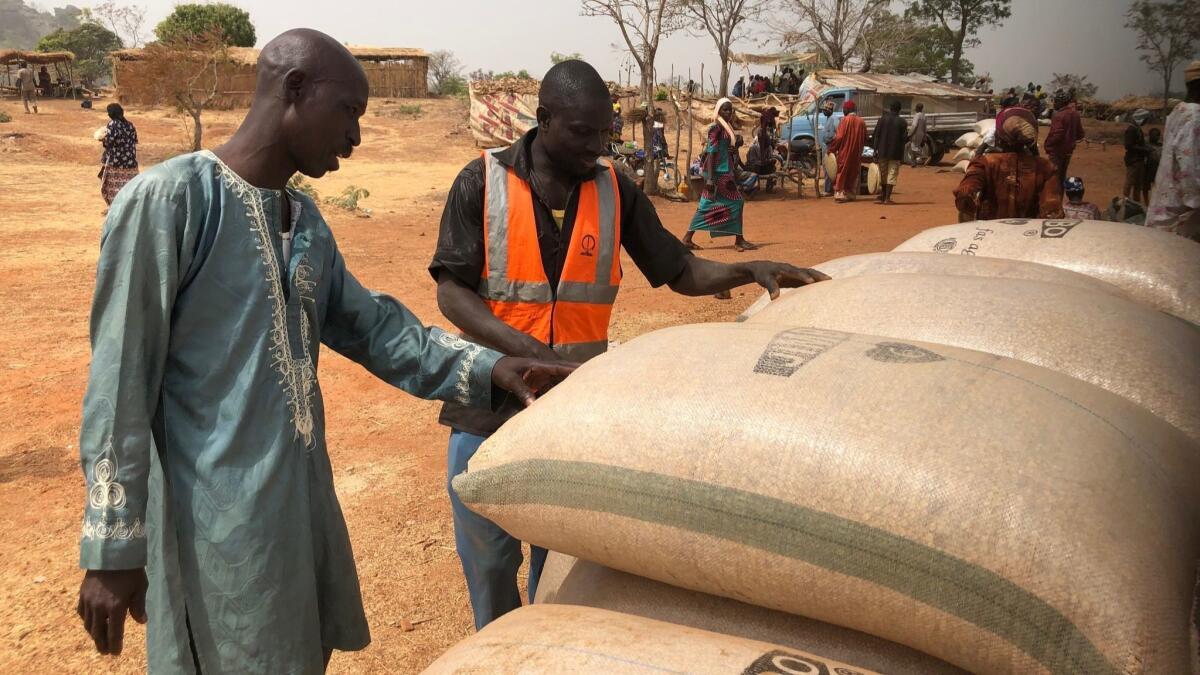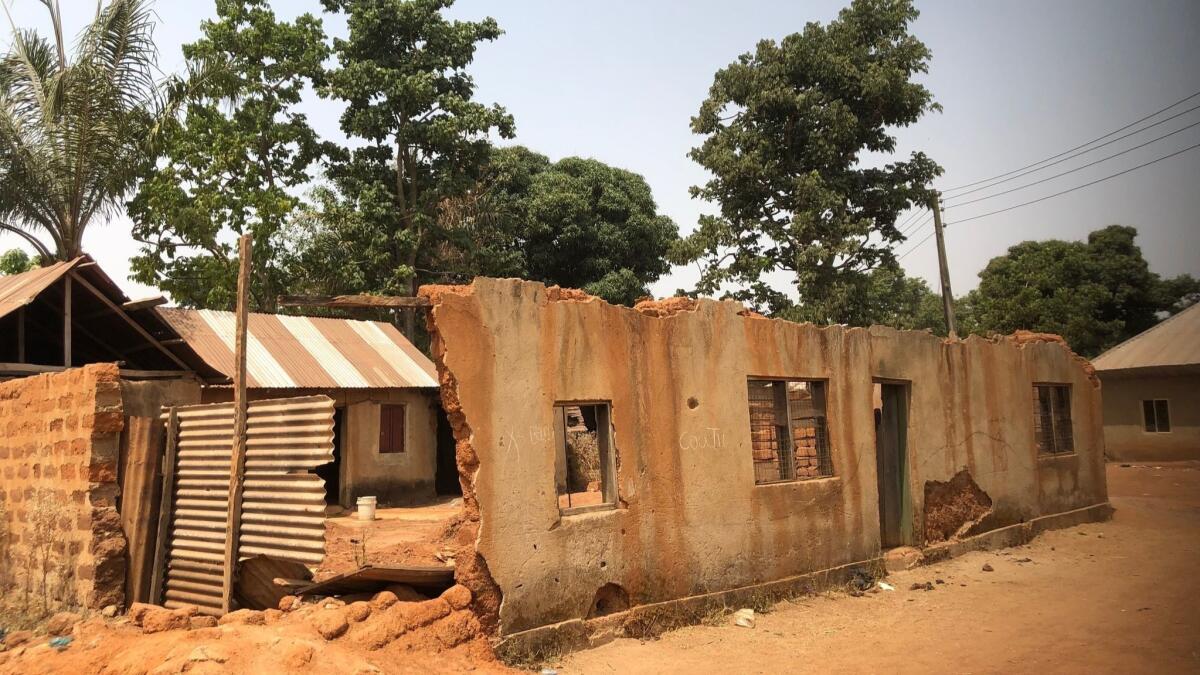Guns, religion and climate change intensify Nigeria’s deadly farmer-herder clashes

- Share via
Reporting from KUFANA DISTRICT, Nigeria — It was about 1:30 a.m. and the dance party was winding down. Dozens of teenagers and twenty-somethings had been celebrating for hours in late December at a church gathering in Kutura, a village in northern Nigeria’s Kaduna state.
Somebody turned off the generator powering the party. As the kids started to wander out of the hall to go home, gunmen waiting outside opened fire.
Haruna Dogara, 20, rushed to escape with a friend, who was shot in the head and killed. Dogara was shot in the arm, hand and leg but managed to limp into a house nearby and was taken to a hospital.
More than six weeks later, in February, he was still there, recovering. “I will go back to Kutura,” Dogara said, speaking quietly and looking down at his hands. “But I’m scared.”
Dogara said he didn’t understand why the gunmen shot him and his friends that night, killing four.

But other residents and local officials in Kafuna, the district that’s home to Kutura, blame the attack on Fulani herders, a semi-nomadic, mostly Muslim ethnic group that herds cattle primarily in northern Nigeria.
They say the group has staged deadly attacks in the last two years on Christian farmers in the district.
“There’s no action from the government,” said Samuel Augustine, a 54-year-old English teacher whose 18-year-old son was killed that night in December. “The police came once to take a report, and that was all.”
The fragile security in Nigeria, set to become the world’s third-most populous country by 2050, has been a central theme in the run-up to national elections scheduled for Feb. 23 after a weeklong delay.
President Muhammadu Buhari, a Fulani former military leader who was elected in 2015, has failed to stop the violence in Nigeria’s so-called Middle Belt, a swath of states riven by the long-simmering conflict between farmers and herders.
Nor has he stamped out the Islamist Boko Haram group that still stages regular attacks in the northeast — a broken election promise that critics, including his chief opponent in the presidential race, Atiku Abubakar, often point out.
In the farmer-herder conflict, nearly 2,000 people were killed last year alone in attacks and counter-attacks, according to Amnesty International.

Farmers and cattle herders have clashed over land for as long as most people can remember in Kaduna. But they’re coming into increased proximity due to climate change.
As grasslands have been degraded in northern Nigeria, semi-nomadic herders have starting moving their herds into densely populated farming areas to the south. At the same time, as Nigeria’s population has boomed, farmers have expanded their fields, often into the herders’ traditional grazing routes.
Disputes between the groups used to be resolved through traditional mediation, but violence has escalated as that system has broken down. Both sides have taken up arms, which have been easier to obtain as illegal firearms circulate more widely from conflict areas in the northeast and Niger Delta, according to the International Crisis Group, a global think tank that works to resolve conflict.
In some places, like Kutura, the conflict has become detached from arguments over land altogether, taking on worrisome religious and ethnic dimensions. It has fanned local and national ethno-religious tensions in a country that is roughly half Christian and half Muslim, rendering the farmer-herder conflict Nigeria’s “gravest security challenge,” according to ICG.
“In the past, politicians did not exploit religious divisions,” said Saleh Momale, permanent commissioner of the Kaduna State Peace Commission, a body created to encourage parties in the divided state to talk.
The mindset today, he said, has become: “You will eliminate me, or I will eliminate you, and the path to war is set.”
The political effect of the spiraling violence is already clear in Kafuna, where people think Buhari has been too soft on the herders because of his ties to the group.
“Before 2015, people were thinking Buhari would come and save the situation,” said Titus Dauda, the district head. “But it’s gotten worse. People have lost faith.”
Dauda sets a smartphone on his desk in the district headquarters and swipes through several recent photographs of the bodies of men, women and children laid on the floor in Ungwan Barde, a remote farming village.
On Feb. 10, 11 people were killed there, he said. When asked who he thought was responsible, Dauda answers, without pause, “Fulani herdsmen, of course.”
Dauda sees the bloodshed as inextricably wrapped up in religious prejudice. He is a Christian, a minority in the mostly Muslim Kaduna state. He said state authorities were more sympathetic to Muslims and didn’t take firm action when Christian farming communities were attacked.
“Muslims always have the upper hand,” he said.
But Fulani herders say they are also vulnerable.
After the Feb. 10 attack on Ungwan Barde, farmers in Kufana retaliated and attacked Fulanis living nearby, Dauda acknowledges. He said that after the retaliation started, he had to arrange security escorts for some Fulani who were too scared to move a corpse out of their village alone.
Days later, Kaduna’s governor said more than 130 Fulanis had been killed in eight villages in that part of the state during that week. Members of the Fulani community in the area put the number closer to 60.
“There is no effort to protect our villagers,” said Umar Gidado Abubakar, a Fulani herder. He said bandits were responsible for the deadly attack on Ungwan Barde, not herders. “We don’t know why [the farmers] blamed us.”
Momale of the peace commission said part of the intensifying political rhetoric had been making the Fulani community a scapegoat for a variety of crimes. “Every sort of violence is ascribed to the Fulani,” he said.
This violence has claimed nearly 3,500 lives in more than 20 of Nigeria’s 36 states in the last three years, according to Amnesty, and presents a daunting challenge to whoever prevails in this week’s vote.
Buhari’s administration has taken action. The federal government has increased the number of police and military in hot spots, launched three major military operations in the Middle Belt region, and consulted with leaders on both sides of the conflict.
In 2018, the government released a National Livestock Transformation Plan, designed, among other things, to set up large ranches and modernize Nigeria’s livestock sector to take some of the pressure off arguments over land.
But both Amnesty International and the International Crisis Group, which have released large reports on the conflict, say that scarce punishment for the perpetrators of crimes has contributed to the problem.
“We don’t want to say this person is guilty, or that person is guilty,” said Momale, the peace commissioner.
In Kaduna, the peace commission has been visiting communities where attacks have occurred, sitting with farmers and herders to help the groups find a resolution.
Momale said he tried to get both sides to understand that if they continued to fight, “there will be never be a winner.”
The commission’s interventions have worked, to some extent, in Godogodo, a village in the southern part of Kaduna state, where Muslim-Christian tensions have run high for years.

Along the two-lane road leading to the village, it’s easy to see how the worlds of the herders and farmers collide. Cattle wander across the paved road and spread out across the hilly agricultural area, walking among carefully planted fields.
Three years ago, farmers who grow maize, beans, yams and potatoes on the outskirts of Godogodo were having regular arguments with local Fulani herders whose cows kept eating their crops.
“We’re patient people,” said Danboyi Dogo, one of the village leaders. “When we tried to talk to the herdsmen when they were in our fields, it became violent. People were killed.”
Many residents stopped farming altogether, rather than risk a confrontation. Maybe the fact that farmers deserted their fields stoked the herdsmen’s confidence, Dogo suggested.
One evening in the fall of 2016, Dogo was at home when he heard gunshots and people moving through Godogodo’s dirt streets. Fulani gunmen formed a ring around the large village in a coordinated attack that lasted 12 hours, he said.
Some people stayed in their houses, watching as businesses were looted and homes burned. Some young men ventured out to defend the village but were overpowered and driven back. Others dived into the high grasses on the edge of the village and hid, praying not to be found.
When it was over, at least 30 people were dead, according to Amnesty International’s report, and hundreds of homes had been burned down.
Military and police have been stationed nearby since then, and the warring groups have met and talked. Now residents agree that things are better, and people are rebuilding their homes and returning to farming.
But the dispute that led to the violence hasn’t totally disappeared.
“We had reconciliatory meetings with the Fulani leaders,” Dogo said, but cattle are still eating the crops.
Gambo Mobutu, pointing to his carefully tended yam crops growing under mounds of earth on the edge of town, says the herders will sometimes help the cows root out the yams from under the dirt.
“Their grass is gone, so they find it difficult,” Mobutu explains. “So they come to our farms and feed the cows.”
He agrees with Dogo that the conflict isn’t over, but he understands why his Fulani neighbors are having a hard time.
And that, at least, is a start.
Mahr is a special correspondent.
More to Read
Sign up for Essential California
The most important California stories and recommendations in your inbox every morning.
You may occasionally receive promotional content from the Los Angeles Times.










